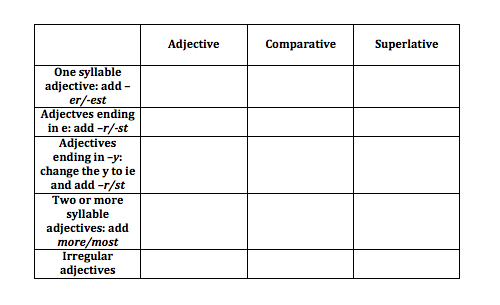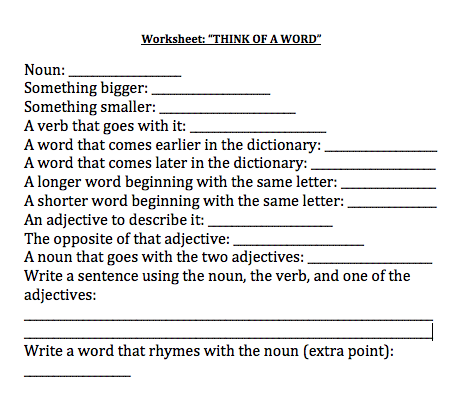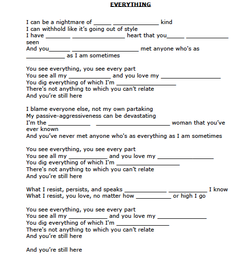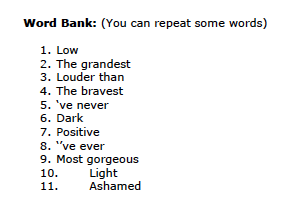Below, I present a lesson plan that you can use in your class to review comparatives and superlatives. Students should have at least a pre-intermediate level.
1. Review:
In the board, review with your students how to form comparatives and superlatives. You can do it by creating a chart that includes the rules to follow and have in mind when working with comparatives and superlatives.
1. Review:
In the board, review with your students how to form comparatives and superlatives. You can do it by creating a chart that includes the rules to follow and have in mind when working with comparatives and superlatives.
2. Worksheet: "Think of a word".
- Divide the class in small teams ( no more than three people) and turn in the worksheet "think of a word" to each team.
- Then, write a noun on the board and ask students to suggest whatever the worksheet tells them.
- It is a competition, so students need to fill in the worksheet as fast as possible but without spelling mistakes.
- Misspellings will be penalised. The first team to complete all the sentences will win a point. Each team will get a point for each word that is correct. Should a spelling be wrong, no point will be awarded. The teacher will ask students to spell the written word is she/he thinks that it might be misspelled. If two groups write the same word in a sentence, they won't get the point.
- Repeat the exercise with different words a couple of times and add up the points to select a winner.
- Divide the class in small teams ( no more than three people) and turn in the worksheet "think of a word" to each team.
- Then, write a noun on the board and ask students to suggest whatever the worksheet tells them.
- It is a competition, so students need to fill in the worksheet as fast as possible but without spelling mistakes.
- Misspellings will be penalised. The first team to complete all the sentences will win a point. Each team will get a point for each word that is correct. Should a spelling be wrong, no point will be awarded. The teacher will ask students to spell the written word is she/he thinks that it might be misspelled. If two groups write the same word in a sentence, they won't get the point.
- Repeat the exercise with different words a couple of times and add up the points to select a winner.
3. SONG: "Everything" by Alanis Morissette
- The teacher will introduce the song to students. He/she will explain ask students to fill in the blanks. The teacher will tell students that the words that are missing are adjectives, comparatives, superlatives and some parts of the verbs in the present perfect.
- Students will listen to the song and complete the gaps.
- If students find the song difficult, the teacher will give them a worksheet that includes the words missing. The teacher will read the words aloud to make easier their identification in the song.
- Repeat as many times as students need.
- Check answers by asking students to read the song aloud.
- Check new vocabulary.
- Identify the adjectives and complete a chart with them like the one at the review stage.
- Students will listen to the song and complete the gaps.
- If students find the song difficult, the teacher will give them a worksheet that includes the words missing. The teacher will read the words aloud to make easier their identification in the song.
- Repeat as many times as students need.
- Check answers by asking students to read the song aloud.
- Check new vocabulary.
- Identify the adjectives and complete a chart with them like the one at the review stage.
4. The guessing game:
This game can be carried out either writing or speaking:
- Describe an object/animal/person using comparatives until someone guesses what it is
e.g. "It is as yellow as a banana, "it is hotter than fire", "it is as round as a ball" (SUN)
- Wrong guesses should be replied to with another clue comparing the real object with that wrong guess, e.g. “No, this thing isn’t a candle. A candle is colder than it."
- Descriptions should include at least two compatives or superlatives
This game can be carried out either writing or speaking:
- Describe an object/animal/person using comparatives until someone guesses what it is
e.g. "It is as yellow as a banana, "it is hotter than fire", "it is as round as a ball" (SUN)
- Wrong guesses should be replied to with another clue comparing the real object with that wrong guess, e.g. “No, this thing isn’t a candle. A candle is colder than it."
- Descriptions should include at least two compatives or superlatives
| lesson_plan_attachments.pdf |






 RSS Feed
RSS Feed
